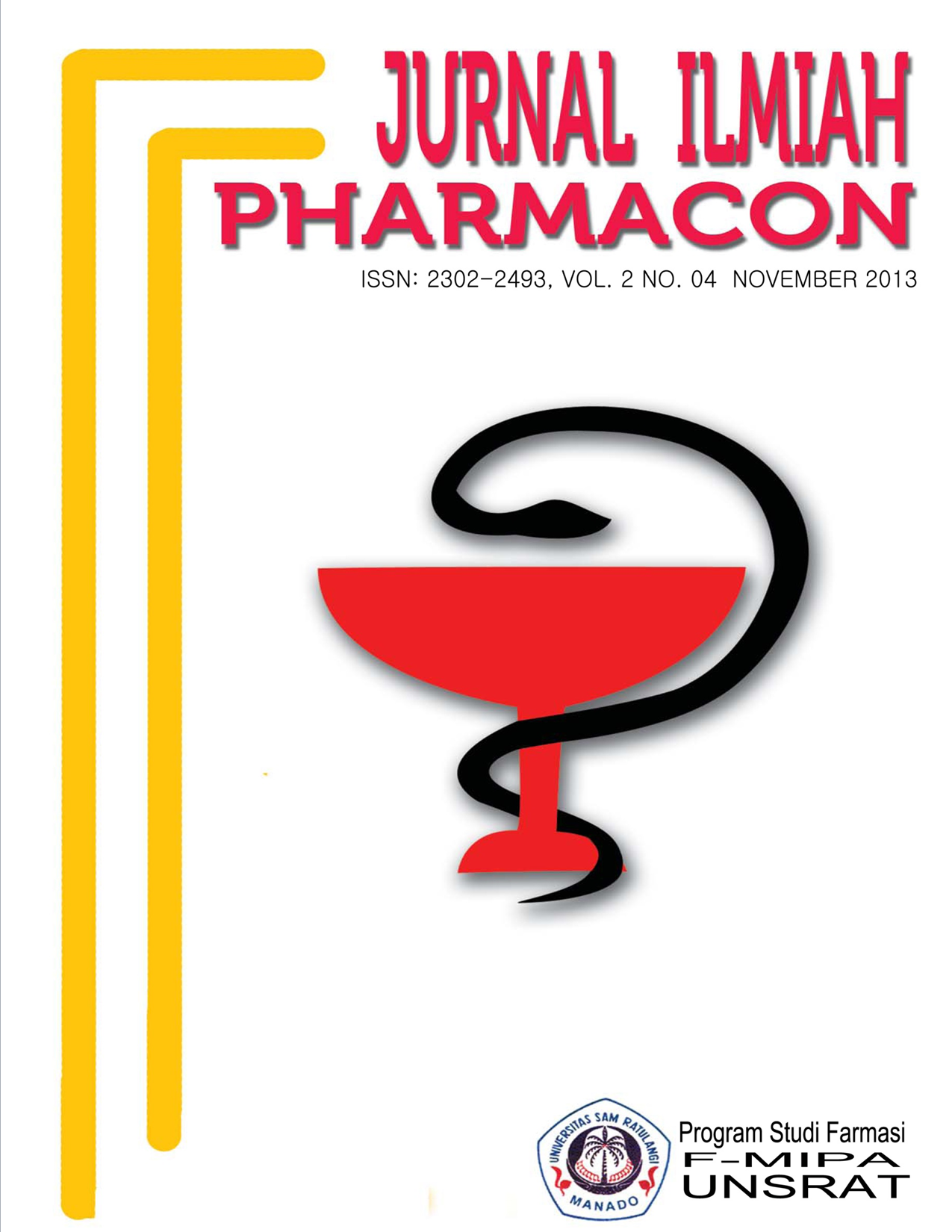IDENTIFIKASI DRUG RELATED PROBLEMS (DRPs) PADA PASIEN CONGESTIVE HEART FAILURE (CHF) DI INSTALASI RAWAT INAP RSUP PROF. DR. R. D. KANDOU MANADO
DOI:
https://doi.org/10.35799/pha.7.2018.21518Abstract
IDENTIFIKASI DRUG RELATED PROBLEMS (DRPs) PADA PASIEN CONGESTIVE HEART FAILURE (CHF) DI INSTALASI RAWAT INAP RSUP PROF. DR. R. D. KANDOU MANADO
Joshua Sinjal1), Weny Wiyono2), Deby Mpila3)
1)Program Studi Farmasi, FMIPA UNSRAT MANADO, 95115
ABSTRACT
Cardiovascular disease is a major health problem in developed and developing countries. Cardiovascular disease is a collection of heart and blood vessel disorders, one of which is Congestive Heart Failure (CHF). Drug Related Problem (DRP) is an undesirable event that afflicts patients associated with drug therapy so that it has the potential to interfere with the expected healing success. This study aims to identify the prevalence of Drug Related Problems in CHF patients. This research is a descriptive study with retrospective data retrieval from 46 medical record records of CHF patients for the period of October - December 2017. Then the analysis of DRPs was carried out with an analysis of literature studies using ESC (2016), BNF 73 (2017), Drug Interaction Facts (2009) and PERKI (2015). The results showed that 41 patients (89%) were at risk of developing DRP with 90 DRP events. Identified DRP categories included inappropriate drug selection (1%), drug interactions (58%), duplication of therapy groups (4%), indications of therapy but not prescribed drugs (13%), synergistic/preventive drug requirements not prescribed (2%), drug dosage was too low (5%), drug dosage was too high (3%), dose regulation was less frequent (2%) and dose regulation was too frequent (6%).
Keywords: Congestive Heart Failure (CHF), Drug Related Problem (DRP)
ABSTRAK
Penyakit kardiovaskuler merupakan masalah kesehatan utama di negara maju dan berkembang. Penyakit kardiovaskuler merupakan kumpulan dari gangguan jantung dan pembuluh darah, salah satunya yaitu Gagal Jantung Kongestif (Congestive Heart Failure). Drug Related Problem (DRP) merupakan kejadian yang tidak diinginkan yang menimpa pasien yang berhubungan dengan terapi obat sehingga berpotensi untuk mengganggu keberhasilan penyembuhan yang diharapkan. Penelitian ini bertujuan untuk mengidentifikasi prevalensi dari masing-masing kategori Drug Related Problems pada pasien GJK. Penelitian ini merupakan penelitian deskriptif dengan pengambilan data secara retrospektif dari 46 catatan rekam medik pasien GJK periode Oktober - Desember 2017. Kemudian dilakukan analisis adanya DRPs dengan analisis studi literature menggunakan yaitu ESC (2016), BNF 73 (2017), Drug Interaction Facts (2009) dan PERKI (2015). Hasil penelitian menunjukkan terdapat 41 pasien (89%) beresiko mengalami DRP dengan 90 kejadian DRP. Kategori DRP yang teridentifikasi, meliputi pemilihan obat tidak tepat (1%), interaksi obat (58%), duplikasi kelompok terapi (4%), indikasi terapi tetapi obat tidak diresepkan (13%), kebutuhan obat yang bersifat sinergis/preventif tidak diresepkan (2%), dosis obat terlalu rendah (5%), dosis obat terlalu tinggi (3%), pengaturan dosis kurang sering (2%) dan pengaturan dosis terlalu sering (6%).
Kata Kunci: Gagal Jantung Kongestif (GJK), Drug Related Problems (DRPs)
Downloads
Published
How to Cite
Issue
Section
License
Authors who publish with this journal agree to the following terms:
- Authors retain copyright and grant the journal right of first publication with the work simultaneously licensed under a Creative Commons Attribution-NonCommercial 4.0 International License that allows others to share the work with an acknowledgement of the work's authorship and initial publication in this journal.
- Authors are permitted and encouraged to post their work online (e.g., in institutional repositories or on their website) prior to and during the submission process, as it can lead to productive exchanges, as well as earlier and greater citation of published work (See The Effect of Open Access)










